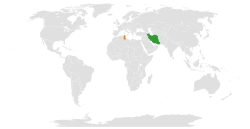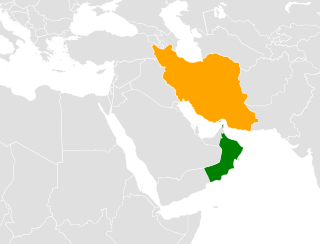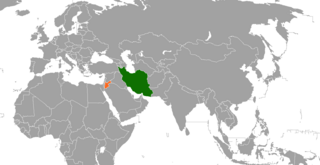 | |
Iran | Tunisia |
|---|---|
Iran-Tunisia relations refers to the bilateral relations between Iran and Tunisia. Both countries are members of the Organisation of Islamic Cooperation, Group of 77 and Non-Aligned Movement. Neither country has a resident ambassador.
 | |
Iran | Tunisia |
|---|---|
Iran-Tunisia relations refers to the bilateral relations between Iran and Tunisia. Both countries are members of the Organisation of Islamic Cooperation, Group of 77 and Non-Aligned Movement. Neither country has a resident ambassador.
Tunisia is one of few Arab countries to develop good relations with Iran [ citation needed ] since the Iranian Revolution of 1979 and the establishment of the Islamic Republic. Tunisia's neutrality has given them a good image on their relations, and somewhat annoyed Saudi Arabia.[ citation needed ]
Tunisia was one of few Arab countries to express condolences over the 2017 Tehran attacks, and both two countries expressed that there would be no limit on increased cooperation between the two nations. [1]
Tunisia, along with their neighbor Algeria, have been accused of praising Iran, which both states have denied. [2]
Tunisia acts as a neutral and balanced power to mediate the standoff between Iran and Saudi Arabia. [3]

Foreign relations of Saudi Arabia are the diplomatic and trade relations between Saudi Arabia and other countries around the world. The foreign policy of Saudi Arabia is focused on co-operation with the oil-exporting Gulf States, the unity of the Arab world, Islamic solidarity, and support for the United Nations. In practice, the main concerns in recent years have been relations with the US, the Saudi Arabian–led intervention in Yemen, the Israeli–Palestinian conflict, Iraq, the perceived threat from the Islamic Republic of Iran, and the effect of oil pricing. Saudi Arabia contributes large amounts of development aid to Muslim countries. From 1986 to 2006, the country donated £49 billion in aid.

The Arab world, formally the Arab homeland, also known as the Arab nation, the Arabsphere, or the Arab states, comprises a vast group of countries, mainly located in Western Asia and Northern Africa. While the majority of people in the Arab world are ethnically Arab, there are also significant populations of other ethnic groups such as Berbers, Kurds, Somalis and Nubians, among other groups. Arabic is used as the lingua franca throughout the Arab world.

Arab League–Iran relations refer to the political, economic, and cultural ties between the League of Arab States and the Islamic Republic of Iran. The former is a regional organization composed of 22 Arab states in MENA with a combined majority of Sunni Muslims, whereas the latter is a country in Western Asia with a majority of Shia Muslims.

The Arab League or League of Arab States was founded by Egypt in 1945, has 22 members and seven observer members so far: Armenia, Brazil, Chad, Eritrea, Greece, Republic of India, Venezuela.

Bilateral relations between Iran and Saudi Arabia have been strained over several geopolitical issues, such as aspirations for regional leadership, oil export policy and relations with the United States and other Western countries. Diplomatic relations were suspended from 1987 to 1990, and in 2016 for seven years following certain issues like the intervention in Yemen, Iran embassy bombing in Yemen, incidents in 2015 Hajj, the execution of Nimr al-Nimr, the attack on the Saudi diplomatic missions in Iran. However, in March 2023, after discussions brokered by China, Iran and Saudi Arabia agreed to reestablish relations.

Saudi Arabia and Turkey relations have long fluctuated between cooperation and alliance to enmity and distrust. Since the 19th century, the two nations have always had a complicated relationship. While Turkey and Saudi Arabia are major economic partners, the two have a tense political relationship, deemed from the historic enmity.
The Arab Cold War was a period of political rivalry in the Arab world from the early 1950s to the late 1970s as part of the broader Cold War. The generally accepted beginning of the Arab Cold War was the Egyptian revolution of 1952, which ultimately led to Gamal Abdel Nasser becoming President of Egypt in 1956. Thereafter, newly established Arab republics defined by revolutionary secular nationalism, and largely drawing inspiration from Nasser's Egypt, were engaged in political rivalries of varying degrees of ferocity with conservative traditionalist Arab monarchies, led chiefly by Saudi Arabia. The approximate end point of this period of internecine rivalry and conflict is generally viewed as being the 1979 Iranian Revolution, which culminated in the installation of Ayatollah Ruhollah Khomeini as the leader of Iran's theocratic government. Subsequently, the bitterness of intra-Arab strife was eclipsed by a new era of Arab-Iranian tensions.

Israel–Saudi Arabia relations refer to the bilateral ties between the State of Israel and the Kingdom of Saudi Arabia. The two countries have never established diplomatic relations; in 1947, Saudi Arabia voted against the United Nations Partition Plan for Palestine, which aimed to split the territory of British Palestine into an Arab state and a Jewish state. As of 2023, negotiations to establish diplomatic relations were ongoing.
The Fourth Extraordinary Session of the Islamic Summit was a conference organised by the Organisation of Islamic Cooperation (OIC) in Mecca on 14 and 15 August 2012. The venue of the conference was Al Safa Palace.

Saudi Arabia–Syria relations refer to bilateral and economic relations between Saudi Arabia and the Syrian Arab Republic. Diplomatic ties between these two countries of the Middle East have long been strained by the major events in the region. Saudi Arabia has an embassy in Damascus, and Syria has an embassy in Riyadh. Both countries are members of the Arab League and share close cultural ties.

Iran–Oman relations are bilateral relations between Oman and Iran. The two countries currently share diplomatic and economic ties dating back to the Pahlavi period. Oman considers Iran not to be a threat perceived by the other Arab states of the Persian Gulf. Both countries are members of the Organisation of Islamic Cooperation, the Non-Aligned Movement and the Group of 77. Iran has an embassy in Muscat whilst Oman has an embassy in Tehran.

Iran and Saudi Arabia are engaged in an ongoing struggle for influence in the Middle East and other regions of the Muslim world. The two countries have provided varying degrees of support to opposing sides in nearby conflicts, including the civil wars in Syria and Yemen; and disputes in Bahrain, Lebanon, Qatar, and Iraq. It also extends to disputes or broader competition in other countries globally including in West, North and East Africa, South, Central, Southeast Asia, the Balkans, and the Caucasus.

Iran–Qatar relations refer to the bilateral relations between the Islamic Republic of Iran and the State of Qatar. Iran has an embassy in Doha while Qatar has an embassy in Tehran. Qatar and Iran have close ties.
The Qatar diplomatic crisis was a diplomatic incident in the Middle East that began on 5 June 2017 when Saudi Arabia, the United Arab Emirates, Bahrain and Egypt severed diplomatic relations with Qatar and banned Qatar-registered planes and ships from utilising their airspace, land and sea routes, along with Saudi Arabia blocking Qatar's only land crossing, as a de facto blockade. The crisis ended in January 2021 following a resolution between Saudi Arabia and Qatar.

The Qatar–Saudi Arabia diplomatic conflict refers to the ongoing struggle for regional influence between Qatar and the Kingdom of Saudi Arabia (KSA), both of which are members of the Gulf Cooperation Council (GCC). It is sometimes called the New Arab Cold War. Bilateral relations are especially strained since the beginning of the Arab Spring, that left a power vacuum both states sought to fill, with Qatar being supportive of the revolutionary wave and Saudi Arabia opposing it. Both states are allies of the United States, and have avoided direct conflict with one another.

Morocco–Saudi Arabia relations refers to the current and historical relations between the Kingdom of Morocco and Kingdom of Saudi Arabia. Morocco has an embassy in Riyadh and Saudi Arabia has an embassy in Rabat.

Saudi Arabia–Tunisia relations refers to the bilateral relations between Saudi Arabia and Tunisia. Saudi Arabia is an absolute monarchy while Tunisia is a democratic republic. However, two countries have engaged in larger cooperations

Algeria is one of the few countries that, despite being a majority Sunni Arab country, has been friendly towards mostly Shia Iran. Although enjoying a cordial relationship, at times relations between two countries have been strained, such as during the Algerian Civil War in the 1990s, or with the current position of the Arab world towards Iran. Nonetheless, Algeria retains close and friendly ties with Iran due to its neutrality at the expense of Saudi Arabia.

Islamic Republic of Iran and Hashemite Kingdom of Jordan share a long but complicated relationship which has, at times, been tense and unstable. Jordan has an embassy in Tehran.
Islamic Broadcasting Union formerly known as Islamic States Broadcasting Organization (ISBO), is a media and public relations wing and one of the specialised body of the Organization of Islamic Cooperation focused on the promotion of Islam and mutual cooperation between the 57 member states through by producing several radio programs. It also televises programs concerning the same issues, in addition to working for the promotion of Arabic languages. Predominantly working in the field of journalism, it highlights the social, political and cultural challenges across the Muslim nations.